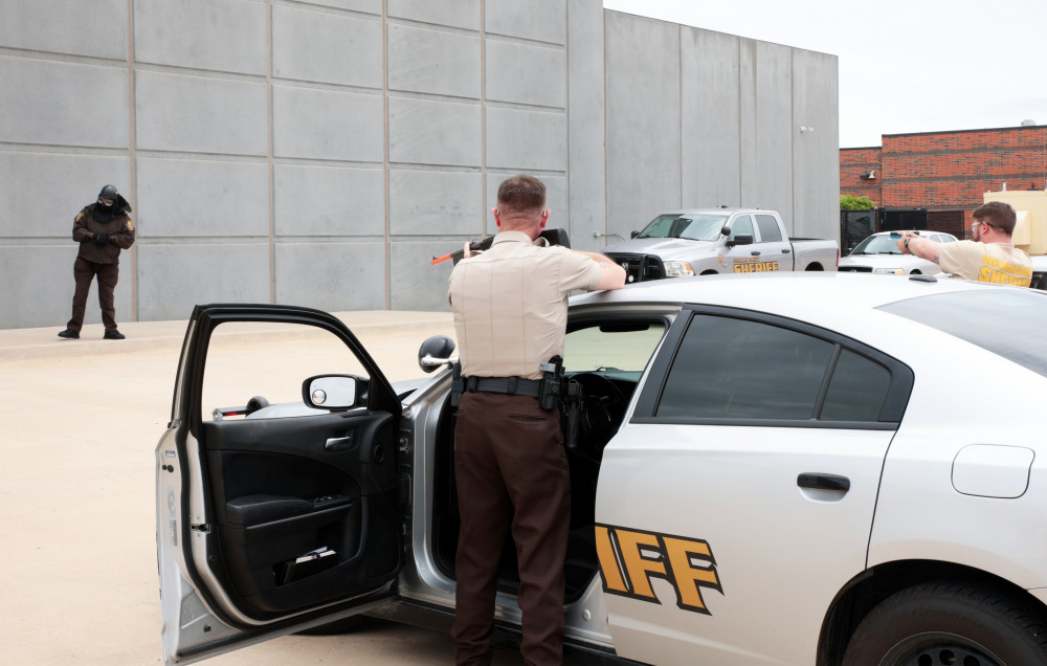Five-oh in Canadian and Grady counties might soon be handing out high fives.
Canadian Valley Technology Center’s Board of Education has formally approved an agreement that opens the door for the first area police academy.
Those who wear badges call it “BPOC.” It’s short for Basic Peace Officers Certification, and it’s coming to CV Tech’s El Reno Campus in January 2023.
“This is a game changer in terms of police training,” said Trent Pettigrew, retired Oklahoma Highway Patrol (OHP) Trooper who was hired this fall as CV Tech’s safety director.
Proper training is paramount for new law enforcement recruits, he said.
Currently, a handful of Oklahoma’s largest police departments, OHP and the Council on Law Enforcement Education and Training, or CLEET, provide law enforcement training academies.
“At the time I joined the OHP, CLEET was centrally located in Oklahoma City,” Pettigrew said. “It subsequently moved to Ada and became less accessible to law enforcement in other parts of the state, most notably western Oklahoma.”
Travel expenses for new recruits erode budgets quickly, said Canadian County Sherriff Chris West. This includes hotel rooms, food and fuel costs associated with sending recruits long distances away to train for months at a time, he said.
“It creates a dilemma for law enforcement agencies on how to get their people trained,” West said. “We all think this is a really great opportunity, not only for us as law enforcement but for the Career Tech system and for Canadian Valley.”
School officials are considering construction of a dedicated public safety training facility, said Superintendent Dr. Gayla Lutts. That project would require an outside funding source, such as a grant, she said. To accommodate the immediate need, the academy will be housed at the school’s administration building in El Reno.
Lutts said she is excited for CV Tech to continue partnering with law enforcement for training needs. The school provided a traffic stop training location for Canadian County Sheriff’s Department last month and has done various training the past couple of years. The BPOC concept is a considerable upgrade in the school’s commitment to being a helping hand for public safety.
“They have the recruits hired, and the training is mandatory,” Lutts said. “Yet there has not been training space available. We are proud to be able to provide the in-demand basic police officer certification training, which will benefit our communities.”
Other technology centers have launched police academies. West said he hopes CV Tech’s academy becomes a gateway for training in western Oklahoma.
Pettigrew envisions the academy providing top-notch training for recruits in accident and crime scene investigations, firearms, defensive tactics, criminal law, cultural diversity, mental and physical wellness, traffic stops and much more.
Yukon Police Chief John Corn said he likes the academy model in which the instructors are comprised entirely of local law enforcement, area sheriff’s department deputies and OHP.
“You may have three instructors in one specific field, and they’re going to be representative of three different agencies,” he said. “They already work together. They already train together. We’re just going to pass that on to new recruits. I don’t think you can put a price on that. It’s so valuable.”
El Reno Police Chief Ken Brown said area law enforcement agencies have envisioned an academy concept for years and were left to wonder how to make it work.
“We have some experienced investigators who have worked some major homicide cases and the whole gambit,” he said. “There’s nothing we can’t bring to the table,” to benefit academy recruits.
“Our recruits are going to be taught by our people in how we function and operate in Canadian County and Grady County.”
The first academy will initially provide training for between 10 and 12 recruits, Pettigrew said, but eventually that number is expected to be up to a maximum of 24 cadets at a time. Recruits will undergo 16 weeks of academy training, followed by three to six months of field training by each cadet’s employing agency.

